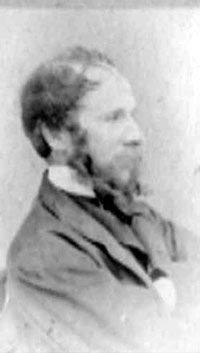THEY LIVED IN LEEDS
Robert Arthington (1823-1900)
The Millionaire Miser
 In the later years of the nineteenth century an odd, gloomy figure was to be seen from time to time in Headingley village, buying a few necessities of life, dressed in old clothes green with age and an ancient stovepipe hat passed down from his father. This was Robert Arthington, often called ‘the Headingley miser’, the subject of much talk and speculation in his lifetime and legendary after his death for his legacies of over a million pounds.
In the later years of the nineteenth century an odd, gloomy figure was to be seen from time to time in Headingley village, buying a few necessities of life, dressed in old clothes green with age and an ancient stovepipe hat passed down from his father. This was Robert Arthington, often called ‘the Headingley miser’, the subject of much talk and speculation in his lifetime and legendary after his death for his legacies of over a million pounds.
From 1870 until shortly before he died in 1900 he lived a strange, reclusive life in his home at 57 Headingley Lane, close to St Michael’s Church. But his story begins in Hunslet, where he was born in 1823 to a wealthy Quaker family. Their money came from the family brewery, which his father gave up on grounds of conscience to devote himself to the cause of temperance. Robert, the only son of four children, studied at Cambridge, but chose not to take a degree. In his twenties he left the Society of Friends and found a spiritual home with the Baptists. When his father died in 1864, he found that he had inherited an enormous fortune of over £200,000. He determined to devote this money to good causes, in particular to promote missionary work around the world in the unknown areas then being explored and opened up in Africa, India and China.
His passion was to spread the gospel among ‘the heathen’ and, as he saw it, shine light into darkness: this was the way to bring about ‘the second coming’. He was in touch with the missionary explorers David Livingstone and Stanley, and supported some of their ventures, though only if they met with his approval: he could be demanding. Over the years he gave enormous sums to the Baptist and other missionary societies, and took a particular interest in Africa, especially Liberia, where he helped to fund the settlement of freed American slaves. A town in Liberia was named after him in recognition of his support, and in 1869 he was appointed consul in Leeds for Liberia. But he did not neglect his home town, giving large donations to various charitable purposes in Leeds, while he himself increasingly chose to live in self-imposed poverty on just a few shillings a week.
He stayed in his family home in Hunslet until his late forties, when there was a sudden change in his life. The story goes that around 1870 he fell in love, and this led him to have a large new house in Headingley Lane built for himself and his hoped-for bride – but he was refused. It’s said that he approached other possible candidates for marriage, to no avail. True or not, it is certain that from then on he retreated further and further into a strange, lonely life. He lived and slept (wrapped in his coat) in only one room, sunless, unheated, thick with dust, lit by just one candle, while the rest of the house remained empty and unfinished. He received almost no visitors – people were brusquely turned away. No one saw him smile, and his greeting was always an enquiry after your soul. (His dark stone house is still there, its entrance turned away from the road, divided now into flats.)
Meanwhile his wealth multiplied. He had invested wisely and spent nothing on his own comfort. Although he gave so much away, he was amazed himself at the riches that kept accumulating. In the last year of his life he gave away over £60,000 to charities, including £20,000 to the fund for the Leeds Hospital for Women and Children. When the new hospital opened at Cookridge in 1905 it was named after him. When he died in 1900, his estate topped a million pounds. Almost all of it went to the missionary societies with which he had been so closely involved and whose work he had passionately supported. This stunning gift (‘Arthington’s million’) helped to provide hospitals and schools as well as missions in remote areas in India and Africa, some of them still in existence today. There his name and his generosity are still warmly remembered, and the label of miser (which stung him when he heard some small boys shout after him) is forgotten.
Eveleigh Bradford
September 2015